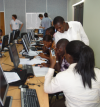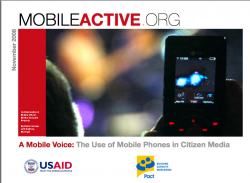Some people are claiming that the conflict in Gaza is a "social war." But so far, social media is used mainly for propaganda and there is a marked absence of voices from people affected by the conflict, and of useful applications of mobile and other social media. As the Israeli bombing of Gaza is continuing and is now in its third day, mobile communication is beginning to make the news but is not playing the dominant role in citizen reporting and aid communications as it has in other conflicts.
A few examples that have not been reported anywhere else: Souktel, an organization in Ramallah that is known for its SMS-job matching service connecting Palestine youth with work, is running a Palestinian "SMS Blood Bank" program for the Red Crescent.








